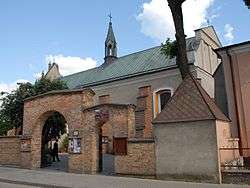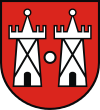Płońsk
| Płońsk | |||
|---|---|---|---|
|
St Michael's Church | |||
| |||
 Płońsk | |||
| Coordinates: 52°38′N 20°23′E / 52.633°N 20.383°E | |||
| Country |
| ||
| Voivodeship | Masovian | ||
| County | Płońsk County | ||
| Gmina | Płońsk (urban gmina) | ||
| Established | 11th century | ||
| Town rights | 1400 | ||
| Government | |||
| • Mayor | Andrzej Józef Pietrasik | ||
| Area | |||
| • Total | 11.6 km2 (4.5 sq mi) | ||
| Population (2010-06-30) | |||
| • Total | 22,500 | ||
| • Density | 1,900/km2 (5,000/sq mi) | ||
| Time zone | CET (UTC+1) | ||
| • Summer (DST) | CEST (UTC+2) | ||
| Postal code | 09-100 | ||
| Area code(s) | +48 023 | ||
| Car plates | WPN | ||
| Website | http://www.plonsk.pl | ||
Płońsk [pwɔɲsk] (Yiddish: פּלאָנסק [Plonsk]) is a town in north-central Poland with 22,500 inhabitants (2010).[1] It is situated in the Masovian Voivodeship (since 1999) at the river Płonka; previously, it was in Ciechanów Voivodeship (1975–98).
History
Płońsk gained city rights from the prince Siemowit IV of Masovia some time between 1399 and 1412. In the early twentieth century, the population of 10,000 was equally divided between Poles and Jews. The Jews lived mostly within the city, whilst the Poles were more scattered and tended to live in the countryside. Many of the Jewish residents of Plonsk immigrated to pre-state Israel for Zionist reasons, spurred on by the idea of building a Jewish homeland.[2] In September 1940, Jews from the town and the surrounding areas were imprisoned in a ghetto in harsh conditions. Some of them suffering a typhus epidemic. In total, 12 000 Jews were prisoners and from October 1942, they were sent to Auschwitz extermination camp. A resident who returned to the city in 1962 found that the major synagogue, three Jewish schools and the Jewish cemetery had been destroyed and demolished.[3]
Landmarks
The church and the old monastery of Calced Carmelites were founded before 1417 by the prince Siemowit IV of Masovia and his wife Aleksandra, Jogaila's sister.
Sports and culture
The Memoriał Andrzeja Trochanowskiego one-day cycling race is based in Płońsk. The race takes place annually on May 1. It is home to a yearly open theatre festival (held in the summer).
Notable residents
- David Ben-Gurion – the first Prime Minister of Israel, was born in Płońsk.
- Abraham Jekuthiel Salman ben Moses Joseph Lichtstein
- Henryk Sienkiewicz – writer
References
- ↑ "Population. Size and structure by territorial division. As of June 30, 2010" (PDF). Central Statistical Office. Retrieved 2010-12-18.
- ↑ Memoirs: David Ben-Gurion (1970), p. 36
- ↑ Ben-Gurion: Father of Modern Israel, Anita Shapira
External links
| Wikimedia Commons has media related to Płońsk. |
- Interactive map of Płońsk
- Płońsk official website
- Independent forum of Płońsk citizens
- Jewish Community in Płońsk on Virtual Shtetl
- The Story of the Jewish Community of Plonsk - an online exhibition in Yad Vashem website
Coordinates: 52°38′N 20°23′E / 52.633°N 20.383°E



